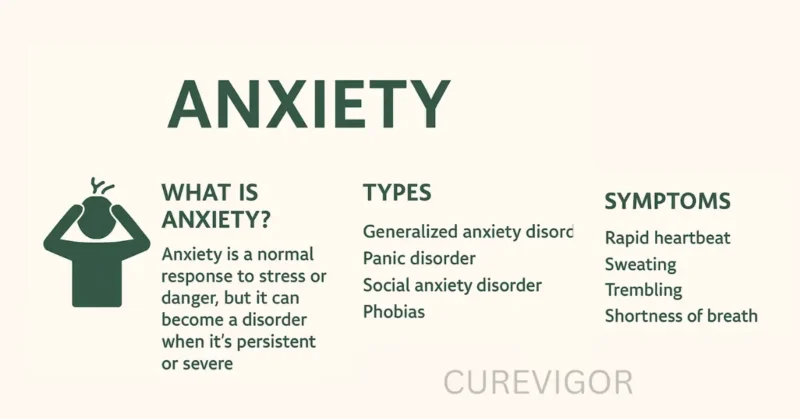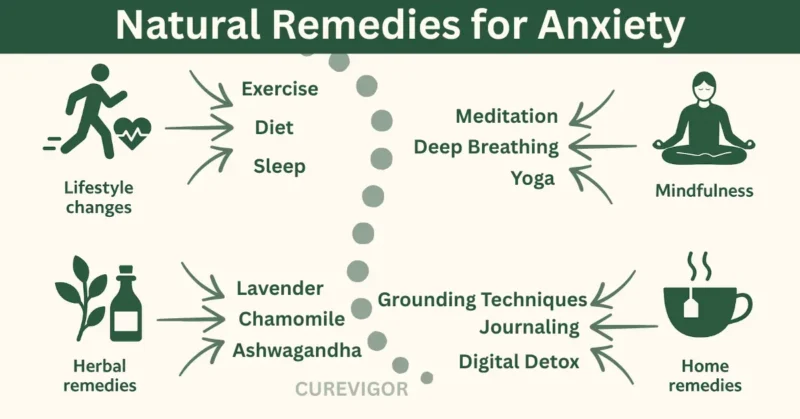What is anxiety and how can you treat it naturally? Explore symptoms, lifestyle changes, mindfulness, yoga, and simple home remedies to manage anxiety without medication.
Thank you for reading this post, don't forget to subscribe!Anxiety is one of the most common mental health challenges worldwide. While occasional worry is a normal part of life, persistent and overwhelming anxiety can interfere with work, relationships, and daily routines.
What Is Anxiety and How to Treat It Naturally | Best Natural Remedies
Millions of people struggle with anxiety symptoms, yet many don’t realize that natural approaches can provide real relief.
Anxiety is a common mental health condition that can be managed naturally with the right techniques and lifestyle changes.

Stress, worry, and nervousness are all symptoms of anxiety disorders. Understanding these illnesses’ symptoms, causes, and available treatments is essential since they can substantially influence a person’s day-to-day activities.
A. What Is Anxiety?
Anxiety is the body’s built-in alarm system. When you sense danger, your brain signals the release of stress hormones like adrenaline and cortisol.
This speeds up your heart, sharpens your focus, and prepares you to respond. In short bursts, anxiety can actually be useful—it helps you meet deadlines, avoid hazards, or perform under pressure.
The problem begins when this alarm doesn’t switch off. Instead of protecting you, it stays on high alert, even in safe situations. That’s when everyday stress turns into an anxiety disorder.
Types of anxiety disorders include:

- Generalized Anxiety Disorder (GAD): Constant worry about daily responsibilities like work, health, or finances, often without a clear cause.
- Panic Disorder: Recurring panic attacks that may cause chest pain, dizziness, or a feeling of “losing control.”
- Social Anxiety Disorder: Fear of being judged or embarrassed in social situations, sometimes leading people to avoid gatherings altogether.
- Phobias: Extreme fear of specific things—such as flying, spiders, or heights—that disrupts normal routines.
Anxiety disorders are among the most common mental health conditions, yet they often go undiagnosed because many people mistake them for “just stress” or “overthinking.”
B. Symptoms of Anxiety
Anxiety can be tricky because it doesn’t look the same for everyone. For some, it shows up in the body; for others, it takes over their thoughts.
Physical symptoms may include:
- A racing or pounding heartbeat that feels like a panic attack
- Sweaty palms or sudden hot flashes
- Muscle tension, especially in the neck, shoulders, or jaw
- Shortness of breath or feeling like you “can’t get enough air”
- Digestive issues such as nausea, stomachaches, or IBS-like symptoms
Emotional symptoms may include:
- Persistent fear or dread, even when nothing is wrong
- Restlessness, like you can’t sit still or relax
- Difficulty concentrating or “blanking out” under stress
- Irritability, snapping at loved ones over small things
- Trouble sleeping due to racing thoughts
Over time, untreated anxiety can lead to fatigue, weakened immunity, and even chronic health issues. Recognizing these early signs is crucial to preventing the cycle from worsening.
Natural Remedies for Anxiety

A. Lifestyle Changes
Exercise:
It’s not just about hitting the gym. Gentle activities like walking in nature, swimming, or even dancing in your living room can reduce anxiety levels.
Outdoor exercise is particularly effective—exposure to natural light helps regulate your circadian rhythm and boosts vitamin D, which is linked to improved mood.
Strength training can also build resilience by teaching your body how to handle physical stress, which translates into better handling of mental stress.
Diet:
Food directly impacts your brain chemistry. For instance:
- Complex carbs (like oats, quinoa, and sweet potatoes) stabilize blood sugar, preventing the energy crashes that fuel anxiety.
- Fermented foods (yogurt, kefir, kimchi) support gut health, and since the gut and brain communicate through the vagus nerve, a healthy gut can reduce anxious thoughts.
- Herbal teas such as green tea provide L-theanine, an amino acid that calms the nervous system.
On the flip side, skipping meals, overdoing caffeine, or consuming too much processed sugar can trigger panic-like symptoms.
Sleep:
Anxiety and poor sleep feed into each other. To break the cycle:
- Create a bedtime ritual—dim the lights, stretch, or sip chamomile tea.
- Keep your room cool, dark, and quiet to support deep rest.
- Avoid scrolling on your phone before bed; blue light suppresses melatonin, the sleep hormone.
Consistency is key—going to bed and waking up at the same time every day trains your body to relax more easily.
B. Mindfulness and Relaxation Techniques
Meditation:
Start small—just five minutes of mindfulness can shift your mindset. Apps and guided meditations make it easier for beginners. Over time, meditation rewires your brain by shrinking the amygdala (the fear center) and strengthening areas linked to self-control and calmness.
Deep Breathing:
Try the 4-7-8 technique: breathe in for 4 seconds, hold for 7, exhale for 8. This simple exercise slows your heart rate and signals safety to your nervous system. Some people also use diaphragmatic breathing—placing one hand on the chest and one on the belly to ensure deep, calming breaths.
Yoga:
Different yoga styles target anxiety in unique ways. Restorative yoga helps quiet the mind, while vinyasa flow releases pent-up energy. Poses like child’s pose, legs-up-the-wall, and corpse pose are particularly grounding. When combined with mindful breathing, yoga reduces cortisol levels and balances the nervous system.
C. Herbal Remedies for anxiety
Lavender:
Studies show lavender essential oil capsules and aromatherapy can reduce anxiety as effectively as some prescription medications. A few drops of lavender oil in a diffuser before bed can promote restful sleep and relaxation.
Chamomile:
Beyond tea, chamomile extract is available in capsule form and has been clinically studied for generalized anxiety disorder. Its calming effects are linked to apigenin, an antioxidant that binds to calming receptors in the brain.
Ashwagandha:
Often called the “stress shield,” ashwagandha is an adaptogen that lowers cortisol, the body’s primary stress hormone. Regular use has been shown to improve resilience to daily stressors and enhance mental clarity.
D. Practical Anxiety Tips
Grounding Techniques:
- When anxiety feels overwhelming, grounding exercises can pull your mind back into the present. Try the 5-4-3-2-1 method:
- Name 5 things you can see
- 4 things you can touch
- 3 things you can hear
- 2 things you can smell
- 1 thing you can taste
This simple practice shifts focus away from racing thoughts and helps calm your nervous system.
Journaling:
Writing down your worries can make them feel less intimidating. A daily journal helps organize thoughts, spot triggers, and release emotions. Gratitude journaling—listing three things you’re thankful for—has also been shown to reduce stress and boost mood.
Digital Detox:
Constant notifications, news updates, and social media comparisons can fuel anxiety. Try setting specific “no-screen times” during the day, such as the first hour after waking or the last hour before bed.
Turning off push notifications and using apps that track screen time can also help you regain a sense of calm.
Routine & Structure:
Anxiety thrives in uncertainty. Creating daily routines—like a consistent wake-up time, scheduled breaks, or a calming evening ritual—can give you a greater sense of control. Even small routines, such as making your bed or preparing meals at the same time each day, can provide comfort and predictability.
FAQs
Q. Can anxiety be treated naturally without medication?
Yes, many people manage anxiety naturally through lifestyle changes and relaxation techniques. Regular exercise boosts endorphins and reduces stress hormones. Eating a balanced diet stabilizes blood sugar and supports brain health. Mindfulness practices like meditation and yoga calm the nervous system.
Herbal remedies such as chamomile and lavender may promote relaxation. Natural methods work best when used consistently. While severe cases may require professional help, natural remedies can significantly ease daily symptoms.
Q. What foods help reduce anxiety naturally?
Certain foods support calmness by nourishing the brain and balancing mood. Leafy greens and legumes are rich in magnesium, which relaxes muscles and nerves.
Fatty fish like salmon provide omega-3s that support brain function. Fermented foods such as yogurt and kimchi improve gut health, linked to lower anxiety.
Complex carbs like oats and quinoa stabilize energy and prevent mood swings. Herbal teas like green tea or chamomile promote relaxation. A balanced diet, low in processed foods and caffeine, makes a big difference.
Q. How does meditation help with anxiety?
Meditation helps quiet racing thoughts and trains the brain to focus on the present moment. By practicing regularly, it reduces activity in the amygdala—the part of the brain that triggers fear.
Deep, mindful breathing during meditation slows the heart rate and lowers stress hormones. Even just 5–10 minutes daily can improve emotional balance. Apps and guided sessions make it easy for beginners to start. Over time, meditation builds resilience against stress. It’s a safe, natural practice that anyone can try.
Q. Is yoga effective for anxiety relief?
Yes, yoga is one of the most effective natural practices for managing anxiety. It combines movement, deep breathing, and mindfulness, all of which calm the nervous system.
Specific poses like child’s pose, legs-up-the-wall, and corpse pose are especially grounding. Regular practice lowers cortisol levels and improves flexibility, strength, and mental clarity.
Gentle styles like restorative yoga are great for stress reduction. Yoga also teaches body awareness, helping you catch tension early. Practicing a few times a week can bring lasting relief.
Q. What are the best natural home remedies for anxiety?
Some of the best natural remedies can be found at home. Drinking chamomile or lavender tea before bed promotes relaxation. Aromatherapy with essential oils like lavender or bergamot creates a calming environment.
Keeping a journal helps process emotions and reduces mental clutter. Practicing deep breathing or grounding techniques brings quick relief during anxious moments.
Regular exercise, even a short walk, boosts mood. Creating a bedtime routine improves sleep, which reduces anxiety. These simple habits can be powerful when practiced daily.
Q. What is the best body treatment for anxiety?
The best body treatment for anxiety includes practices that promote physical well-being and reduce stress. These may include:
- Regular Exercise: Yoga, walking, running, or swimming can significantly reduce stress.
- Massage therapy: It helps to relax muscles and reduce stress.
- Progressive Muscle Relaxation involves tensing and slowly relaxing different muscle groups.
- Mindfulness Practices: Such as meditation and deep-breathing exercises.
- Adequate Sleep: Ensuring sufficient, restful sleep is crucial for managing unease.
Conclusion
Anxiety can feel overwhelming, but it doesn’t have to control your life. By making lifestyle changes, practicing mindfulness, and considering natural remedies such as herbs and supplements, many people find lasting relief.
Final takeaway: While severe anxiety may require professional care, natural remedies offer powerful tools for anxiety management and can complement traditional treatment. The key is consistency—small daily habits can add up to significant long-term improvements.
Get more practical Health and Wellness Tips.
You might like to read:

